OpenAI launches GPT-5: faster, smarter, and more human. Here's what you need to know.

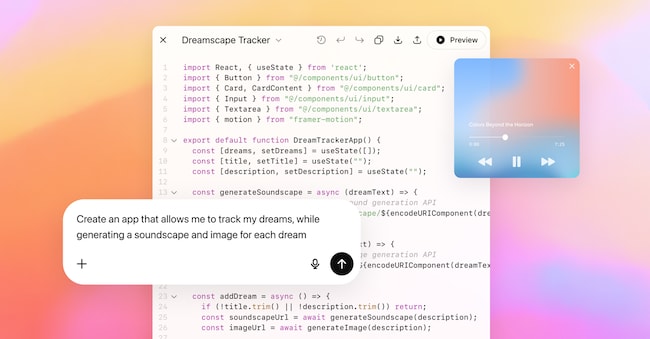
Thirty-two months after ChatGPT's debut, GPT-5, OpenAI's new model, has been released. Founder Sam Altman has described it as "a major step toward AGI (Artificial General Intelligence)." "Going back to GPT-4 after trying GPT-5 will be frustrating," Altman said during a briefing with reporters. "The difference is comparable to going back to an old phone with a pixelated screen after an iPhone. GPT-3 felt like a high school student," he said. "GPT-4 feels like a college student. GPT-5 is like dealing with an expert with a PhD."
As with the latest GPT4o model, GPT-5 will also be made available free of charge to all ChatGPT users. Three versions are available via API: GPT-5, GPT-5 Mini, and GPT-5 Nano, to balance performance and cost. There are also Pro and Plus versions: the main difference is the usage limits. The Pro version ($200) offers unlimited GPT-5 and access to GPT-5 Pr. The Plus version, with a subscription costing €21 per month, offers much higher usage limits than the Free version, which, as we recall, offers access to GPT-5 & GPT-5 mini. This is the first time that Free users have access to a reasoning model.
For Plus users, it will be the default template, eliminating the complexity of the template selector. They will also have a much greater use of GPT-5. When they exceed that limit, they will switch to GPT-5 Mini, which is still very good.
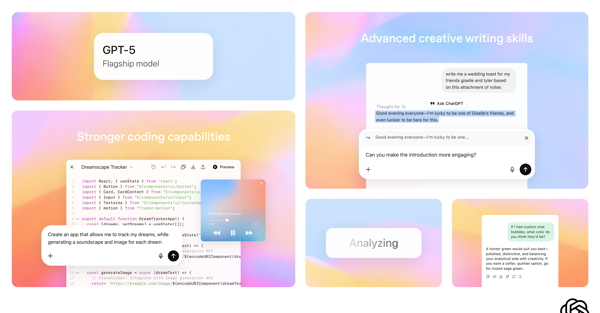
Conceptually, GPT-5 integrates many technological components, including the so-called reasoning model and intelligent agent functionality. It is therefore poised to be a sort of "unifier" of OpenAI's proposal. The OpenAI team has emphasized that this is the fastest, most precise (fewer hallucinations), most intelligent (in math, science, programming), and most human-like model. But it's the programming aspect that they seem to want to focus on most. "GPT-5," they reiterated, "is the best model for coding OpenAI has ever created." "One of the most incredible things is that it can instantly create an entire software program from scratch. I believe," Altman explained, "that the concept of 'software on demand' will be a hallmark of the GPT-5 era."

During the presentation, they demonstrated an example of Vibe coding, which means you can create any app or software simply by asking the model, without having to know how to code. Specifically, they created a web app for learning French. "Building such a site would take a human programmer hours of work. GPT-5 does it in a few seconds." In practice, GPT-5 generated 600 lines of code. Furthermore, they demonstrated that each time you give GPT-5 the same prompt, you can get different results, all of which work.
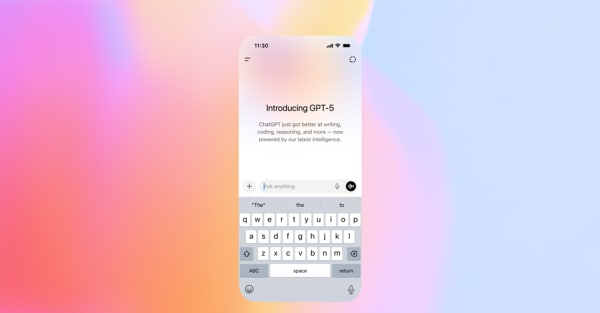
GPT-5 has been trained to recognize when it cannot complete a task, avoid speculation, and better explain its limitations. This dramatically reduces the incidence of fabricated but convincing answers compared to previous models. The researchers explained that it has been trained not to lie or fake fictitious answers. In the case of potentially ambiguous or dangerous questions, GPT-5 responds only with general content to reduce risks. A new feature has also been introduced: the "reasoning effort parameter," which allows you to choose how much the model should "reason." In short, you can decide whether the model should reason deeply or whether it can remain faster and more superficial (useful for simple tasks).
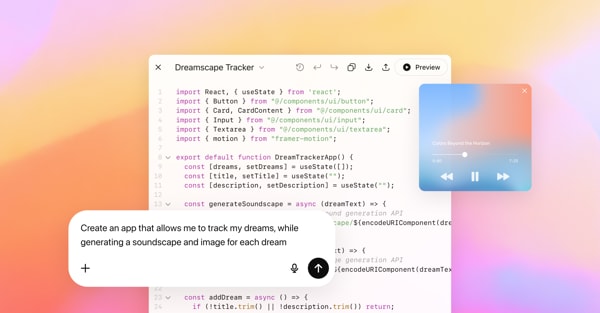
GPT-5, OpenAi claims, noting that it doesn't replace a doctor, is the best OpenAI model ever built for health-related questions. It's more proactive in flagging potential problems and asking questions, and can help understand results, formulate appropriate questions to ask specialists, and evaluate options when making decisions.
GPT-5 also offers more accurate and reliable responses and adapts to the user's context, knowledge level, and geographic location – thus providing safer and more useful responses in a wider range of scenarios.
On the security front, one of their goals is to achieve a non-deceptive model. "This is crucial for security," explained Nick Turley, ChatGPT's product manager. "We want the model not to lie to users, both for ethical reasons and to ensure a quality user experience: people need to be able to trust the system." To address this, they trained GPT-5 to be honest. Another important aspect is to prevent users from abusing the model for malicious purposes. "In the past," he explained, "we used a binary system: if a prompt was considered safe, the model responded. If it was dangerous, it rejected. With GPT-5, we use an approach called 'safe completions.' The model provides useful answers, but within the bounds of safety. For dual-use questions, GPT-5 limits itself to general, safe information that cannot be used to harm." Furthermore, they conducted over 5,000 hours of testing with external red teams to ensure the system is robust against abuse.
Its release comes as organizations such as BNY Mellon, California State University, Figma, Intercom, Lowe's, Morgan Stanley, SoftBank, T-Mobile, and others have already empowered their employees with AI—with 5 million paid users now using ChatGPT's enterprise products—and have begun rethinking their API operations.
In March 2025, it raised $40 billion at a valuation of $300 billion, and a secondary share sale is underway that could bring the valuation to $500 billion, making OpenAI the most valuable private startup in the world. Today, Sam Altman's brainchild has over 120 million daily active users and approximately 700 million weekly active users. It controls a dominant share, estimated between 59% and 63%, of the AI assistant market. The goal is to transform OpenAI into a cornerstone of the global digital infrastructure, with annual recurring revenues growing from approximately $12 billion today to a forecast of $20 billion by the end of 2025. Gpt 5 is not only OpenAi's most powerful AI model, but also proof that ChatGpt is now the undisputed leader in the sector. But how do you measure this market?
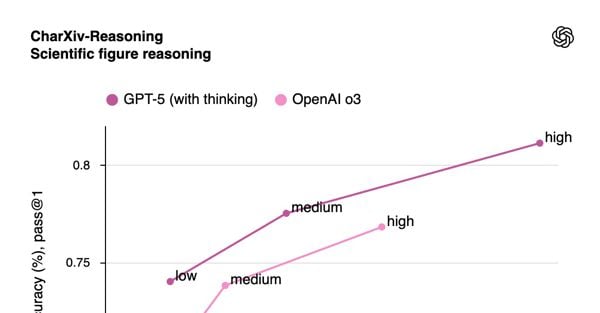
Models today are evaluated by benchmarks that measure their reasoning ability and performance in fields like programming and mathematics. They are also evaluated by their agentic characteristics, that is, their ability to autonomously orchestrate functions. We know there's no way to verify the tests that evaluate a model's intelligence. As with other models, we have to trust what the developers say. GPT-5, OpenAi writes, "is significantly smarter across the board, as demonstrated by its performance in academic and human-assessed benchmarks, particularly in mathematics, programming, visual perception, and health. It sets new standards in mathematics (94.6% on AIME 2025 without tools), real-world programming (74.9% on SWE-bench Verified, 88% on Aider Polyglot), multimodal understanding (84.2% on MMMU), and health (46.2% on HealthBench Hard), and these improvements are noticeable in everyday use." Thanks to the extended reasoning of the Pro version of GPT-5, the model also sets a new state of the art on GPQA, achieving a score of 88.4% without tools. Recall that Gemini 2.5 Deep Think achieved on benchmarks such as LiveCodeBench v6 (87.6%), Humanity's Last Exam (34.8%) and IMO 2025, where it achieved the bronze medal level with a remarkable 60.7%. In programming in particular, Opus 4.1 reaches 74.5% in the SWE-bench Verified benchmark, surpassing the previous generation (Opus 4 stopped at 72.5%).
The problem, however, isn't the benchmarks. The first flaws in AI's scaling laws emerged last summer. As access to data increases, we no longer see a proportional improvement in algorithm efficiency. The more they read, the more they learn, but they don't improve accordingly. Furthermore, while processing power continues to grow, thanks in part to massive investments from Big Tech (and the confidence of financial markets), large language models struggle to find datasets.
How far are we from AGI? Sam Altman explained that GPT-5 isn't AGI yet, but it's a big step forward. Achieving AGI will require models to continuously learn from the real world, something GPT-5 doesn't yet do.
News and insights on political, economic, and financial events.
Sign upilsole24ore





